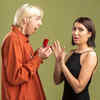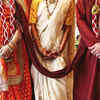
Marriage has long been romanticized as the ultimate destination for love—a promise of stability, companionship, and unconditional devotion. Yet, in today’s world, more people than ever find themselves hesitant, even fearful, of walking down the aisle. This apprehension stems not from a lack of love but from the profound changes in how individuals view relationships, commitment, and, most importantly, themselves.
Marriage anxiety has become a mirror reflecting society’s evolving priorities, emotional complexities, and the undeniable pressure to conform to an ideal that no longer fits everyone. To understand this phenomenon, we need to delve deeper into how traditional expectations, modern lifestyles, and shifting definitions of love have shaped our collective psyche.
Breaking Away from Tradition

For centuries, marriage was more than a personal choice—it was an obligation, a rite of passage dictated by societal norms. It symbolized security, status, and the beginning of a family. Women, in particular, were often relegated to roles defined by their marital status, while men were seen as providers whose success was incomplete without a spouse.
Fast forward to today, and the landscape has drastically changed. Education, financial independence, and career aspirations have given individuals, especially women, the freedom to reimagine their lives outside the confines of marriage. As people prioritize personal growth and autonomy, the notion of marriage as a universal milestone has lost its luster.
This newfound independence has brought with it the ability to question long-standing norms. Why should one commit to a lifetime of togetherness if it risks compromising individuality? The fear of losing oneself in the expectations and sacrifices of marriage is a significant factor in this growing anxiety.
Self-Awareness: The Double-Edged Sword

Modern society places immense value on self-awareness and self-care. People have become deeply introspective, striving to understand their emotions, needs, and boundaries. While this has empowered many to make better life choices, it has also made relationships more complex.
Marriage demands vulnerability and compromise—qualities that often clash with the emphasis on personal fulfillment. The fear of losing balance between self-prioritization and relationship demands leads many to view marriage as a potential threat to their hard-earned independence.
Additionally, the heightened self-awareness of today’s generation brings with it an acute understanding of relationship dynamics. People are wary of repeating the mistakes they’ve witnessed in their parents' or peers' marriages. The awareness of potential pitfalls—like communication breakdowns, infidelity, or unmet expectations—adds to the anxiety surrounding lifelong commitment.
The Changing Definition of Love

Love, as an ideal, has undergone a seismic shift. Once seen as a sacred and unconditional bond, it is now viewed through the lens of realism and individualism. The rise of dating apps, casual relationships, and non-traditional dynamics like situationships has blurred the lines of commitment.
In today’s fast-paced, hyper-connected world, love is often treated as transient and negotiable. Many feel that the concept of unconditional love is outdated—a relic of a time when societal pressures overshadowed personal desires. This skepticism makes the idea of "forever" daunting.
In movies, books, and even social media, love is celebrated for its intensity and spontaneity, but seldom for its perseverance. The reality of maintaining a relationship through life’s ups and downs rarely fits the romanticized narratives people consume. This dissonance fuels the fear that marriage may not live up to expectations.
Cheating, Situationships, and Talking Stages

Modern relationships are riddled with ambiguity. Terms like "situationships" and "talking stages" reflect a culture where commitment often takes a backseat to convenience. This ambiguity has bred mistrust and insecurity, making the concept of marriage—a definitive and lifelong commitment—even more intimidating.
Cheating, once a taboo subject, is now openly discussed as a common relationship challenge. With social media and dating apps making temptation more accessible than ever, the fear of betrayal looms large. Many wonder: If loyalty can’t be guaranteed in the short term, how can it be expected over a lifetime?
A Generation Craving More

Ironically, even as people fear marriage, they crave deeper emotional connections. In a world where loneliness is a growing epidemic, the need for love, affection, and validation is stronger than ever.
However, this need is often coupled with unrealistic expectations. Partners are expected to be everything—best friend, confidant, cheerleader, and soulmate—all while respecting boundaries and fostering independence. The pressure to find someone who fulfills all these roles can make the prospect of marriage feel overwhelming and unattainable.
Marriage Anxiety: A Reflection of Modern Society

At its core, the fear of marriage is not just about commitment—it’s about the tension between tradition and modernity, between societal expectations and personal desires. Today’s generation is caught between wanting love that feels timeless and fearing the sacrifices it may demand.
This anxiety is also a product of societal change. The traditional family unit, once the cornerstone of stability, is no longer seen as the only path to happiness. People are exploring alternative lifestyles, from cohabitation to remaining single, as valid and fulfilling choices.
Ethics and Expectations in an Evolving Society

Marriage, at its best, is a partnership built on mutual respect, trust, and love. But in an ideal society, it should also honor individuality and equality. The ethics of marriage today demand that it not be seen as an obligation but as a choice made with clarity and intention.
For marriage to thrive in the modern world, it must evolve beyond traditional gender roles and expectations. It should celebrate the union of two individuals who support each other’s growth, rather than confining them to predefined roles. Redefining Happily Ever After

The fear of marriage isn’t inherently negative—it’s a sign that people are questioning outdated norms and striving for relationships that align with their values. To overcome this anxiety, society must redefine "happily ever after" as a journey, not a destination.
Marriage can be a beautiful and fulfilling experience when it’s approached with honesty, empathy, and a willingness to adapt. It’s not about finding someone perfect but about creating a partnership that grows and evolves over time.
In a world where independence and connection often feel at odds, the key to overcoming marriage anxiety lies in balancing both. By embracing vulnerability and redefining love on their own terms, individuals can find joy in the imperfect yet rewarding journey of commitment.
 Marriage has long been romanticized as the ultimate destination for love—a promise of stability, companionship, and unconditional devotion. Yet, in today’s world, more people than ever find themselves hesitant, even fearful, of walking down the aisle. This apprehension stems not from a lack of love but from the profound changes in how individuals view relationships, commitment, and, most importantly, themselves.
Marriage has long been romanticized as the ultimate destination for love—a promise of stability, companionship, and unconditional devotion. Yet, in today’s world, more people than ever find themselves hesitant, even fearful, of walking down the aisle. This apprehension stems not from a lack of love but from the profound changes in how individuals view relationships, commitment, and, most importantly, themselves.




 Ironically, even as people fear marriage, they crave deeper emotional connections. In a world where loneliness is a growing epidemic, the need for love, affection, and validation is stronger than ever.
Ironically, even as people fear marriage, they crave deeper emotional connections. In a world where loneliness is a growing epidemic, the need for love, affection, and validation is stronger than ever.

 Marriage, at its best, is a partnership built on mutual respect, trust, and love. But in an ideal society, it should also honor individuality and equality. The ethics of marriage today demand that it not be seen as an obligation but as a choice made with clarity and intention.
Marriage, at its best, is a partnership built on mutual respect, trust, and love. But in an ideal society, it should also honor individuality and equality. The ethics of marriage today demand that it not be seen as an obligation but as a choice made with clarity and intention.
